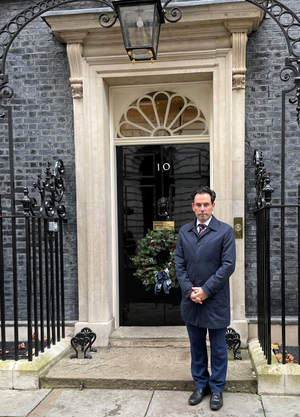CEO Update | 28 November 2022

Thank you to all who have joined our BIA campaign to seek a solution to cuts in SME R&D tax credits introduced in the Autumn Statement.
Today I was able to raise our concerns personally by handing a letter signed by over 300 CEOs to the Health Secretary and the Business Secretary at a meeting in Number 10 who assured me that this issue is being taken seriously at the very top of government. You may also have seen the concern raised in the Sunday Times. It’s nonsensical and frustrating for research-intensive life science firms to be lumped into the same pot as non-innovative SMEs using no-win fee tax consultants to claim credits with little check.
We have a further meeting with HM Treasury officials tomorrow, to whom we outlined a proposed solution last week, but the parliamentary timetable is against us – in that the law that affects the changes in the Budget is in front of the House of Commons this evening and on Wednesday.
What’s frustrating is that the government has admitted in a parliamentary answer this week that its own analysis reveals that HMRC estimates under the proposed policy fraud in the SME R&D tax relief scheme to be reduced from '7.3% to around 6% in future years' saves £200-300 million.
We share the Government’s desire to reduce fraud but it is clear from their answer that their proposed measure will not achieve this. Still, we do know it will severely impact the UK’s life sciences sector – a true success story and valuable pillar of our innovation-based economy.
It’s good to see MPs from all sides of the house asking questions on this issue but if we don’t see legislative movement this week I fear the unintended consequences of this decision will be visited on the sector for months – if not years ahead. The government will really be shooting itself in the foot if it is unable to rapidly review a decision made in haste, where it understands the implications for a key sector, where it has been given a potential solution and knows the strength of the UK life science entrepreneurial community concern.
For the latest on this fast-moving issue, which I hope we can both explain the detail and put into a broader context, please join us for our BIA webinar on the R&D tax relief changes in the Autumn Statement at noon tomorrow.
The issue overshadows for me a key Life Sciences Day where our industry met with the government to discuss progress on delivering the Life Science Vision – a shared agenda we have been working on for years. As well as launching the missions, the Health and Business Secretaries also announced a suite of additional measures to further cement the UK’s global leadership in life sciences. These included dedicating a new Life Sciences Investment Envoy, with the Business Secretary Grant Shapps appointing Dan Mahony, Chair of the BioIndustry Association and Entrepreneur in Residence at Evotec, to the role. Dan looks forward to championing investment into our growing life sciences and biotech sector and will set out his ambitions for the role in the coming weeks.
Governance of artificial intelligence (AI)
BIA has submitted a response to the Science and Technology Committee’s inquiry on the governance of artificial intelligence (AI). In our response, we covered the different applications of AI in the life sciences and how a sector-based, application-based approach to regulation would best support innovation.
BIA responds to MHRA consultation on statutory fees
Last week the BIA responded to the Medicines and Healthcare products Regulatory Agency (MHRA) consultation on proposals to increase statutory fees. The consolidated BIA response was developed with input from our Regulatory Affairs Advisory Committee. We provided BIA members’ feedback on the following proposals and the impact of these proposed changes on the innovative life sciences industry including SMEs, which would apply from 1 April 2023:
- A 10% indexation uplift across the Agency’s statutory fees.
- A further uplift for 61 significantly under recovering fees, on top of the indexation uplift, to achieve cost recovery.
- The introduction of 22 new fees for services that require cost-recovery since the last fee changes for medicines and medical devices.
Generally, BIA member organisations would support the proposals. This will ensure the MHRA is adequately resourced with talented and experienced staff and financially sustainable in the long term, benefiting both the life sciences industry and UK patients while protecting public health.
However, these proposals are likely to have a disproportionate impact on SMEs that are developing innovative therapies. The BIA is advocating for fee reductions and waivers for the Innovative Licensing and Access Pathway (ILAP) and the Early Access to Medicines Scheme (EAMS) for SMEs to support and encourage innovation in the UK.
It is worth adding that the proposals in this consultation could have an impact on the development and access to medicines for rare conditions. The increasing costs for scientific advice mechanisms and medical device assessment may discourage some companies developing products for smaller patient populations from making marketing authorisation applications or device submissions in Great Britain.
It is important that the consultation outcome supports the ambitions of the Life Sciences Vision and ensures that a world-leading regulatory agency can fulfil its regulatory functions and deliver responsive and efficient services for the life sciences and biotech industry.

Steve Bates OBE
CEO, BioIndustry Association
.png)
.png)